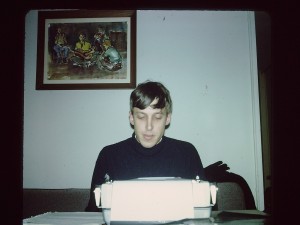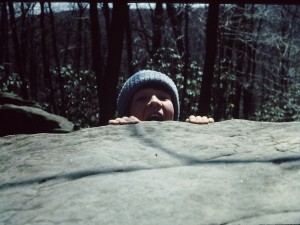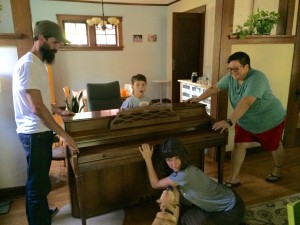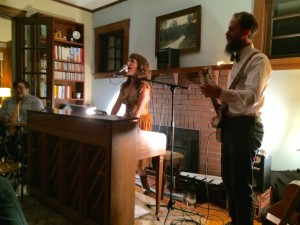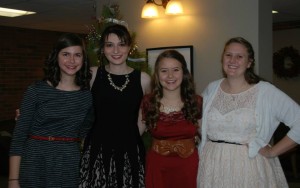The peanut-gallery chatter was almost as entertaining as the 1970s-era slide show my dad was projecting on the wall. Not that I was surprised—I‘d expect nothing less when the Tennants and Sysyns got together.
Our two families have been spending time together since before my life began, but the regularity dipped considerably when us four kids grew up and started moving off on our own. Those stretches of years and miles made this particular reunion, in July 2015, especially epic: 14 of us from Illinois, Michigan, Arizona, and Oregon were gathered at a house on the Oregon coast. Our group represented three generations of two families: my dad’s and “Uncle” Pete’s, my dad’s best friend from college.
In preparation for the reunion, my dad—forever the obsessive photographer—had scanned five decades of slides to share. We watched the greatly-anticipated show our last night together.
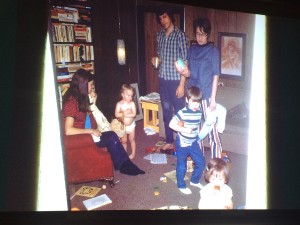 The early 70s photos showcased my dad and Uncle Pete as beat-poet wannabes. Their weary faces suggested all-nighters spent drinking wine and listening to Miles Davis, scrawling verses in composition books and debating philosophy. But the scene around them tells the real story: four kids under the age of five, joining miniature forces to raise full-sized havoc. As adult versions of those kids, we laughed at the scene our little selves had created in the cramped apartment. Those poor beat poets had no idea what had hit them.
The early 70s photos showcased my dad and Uncle Pete as beat-poet wannabes. Their weary faces suggested all-nighters spent drinking wine and listening to Miles Davis, scrawling verses in composition books and debating philosophy. But the scene around them tells the real story: four kids under the age of five, joining miniature forces to raise full-sized havoc. As adult versions of those kids, we laughed at the scene our little selves had created in the cramped apartment. Those poor beat poets had no idea what had hit them.
* * * * *
Dad and Uncle Pete lived next door as college freshmen. Their love for the arts and their well-matched senses of humor sealed their friendship from the beginning, and they lost no time conjuring up the epic pranks they would one day tell their children about (again and again).
There was the time, for instance, when they changed the alarm clock of their dorm’s earliest riser, who had taken on the responsibility of pounding on everyone’s doors up and down the hall each morning to ensure no one overslept.
“You should have seen the guys all coming out of their rooms at three in the morning, ready to pummel poor George Lowe,” my Dad would say, hardly able to get through the telling of the story due to the laughter that erupted from within as he recalled the scene.
When my dad finds something really funny, he laughs in an extreme, choked up way, as if he’s on the verge of crying. My brother and I agree that watching Dad laugh is often more funny than whatever it is he’s laughing at.
The telling of the Alarm Clock Story was often paired with other classics, like the Co-ed Visiting Hours Story, about the time when my dad and a couple other guys on the floor managed to “lock” Pete alone in his dorm room during the university’s first ever co-ed open house.
“He missed the whole thing. We never heard the end of that,” Dad would say, his shaking shoulders indicating a level of laughter that was so extreme it was almost silent.
Not surprisingly, the hilarity at the core of Dad and Pete’s friendship inspired laughter and eye-rolling in the women who eventually married them, which later spilled over into our regular family gatherings each spring break, New Year’s Eve, and summer.
Soon us kids had a whole new generation of funny stories to recall together, from the dance routine we choreographed to the Xanadu album (one of my favorite gifts that Christmas), to the time our families met at a no-nonsense campground in Ohio late one night, unknowingly setting up our enormous shared tent terrifyingly close to train tracks. The rumbling and whistling of the train that woke us up in the dead of night set a new standard for a “rude awakening.”
* * * * *
The Epic Reunion slideshow continued, shifting from photos of busy toddlers and tired parents into a series of photos Dad and Pete staged for the singular purpose of annoying and alarming our mothers.
“Look, there’s the time Billy almost fell into that canyon,” Uncle Pete said, pointing at the projected image of my brother’s eyes peeking over a stone ledge, apparently hanging on for dear life with his fingernails. “We were so relieved we made it back with him alive” Pete added in a stage whisper, ”We never would have heard the end of it from your mothers.”
Uncle Pete is the master of the elaborate aside, holding one hand flat along the edge of his mouth as if trying to keep what he’s saying from a select person or two. And my dad is the master of egging Pete on.
Together, they’re masters of laughter, and as the slideshow came to an end, I realized my brother and cousins and I have been their apprentices. I looked over at the faces of my own daughters—the third generation of this heritage of hilarity—and felt satisfied that our reunion week with the Sysyns had served as a solid orientation in their own schooling of stories and silliness. May they grow into adults who fully grasp the value of friendship, traditions, and pure, uncontrollable laughter.
